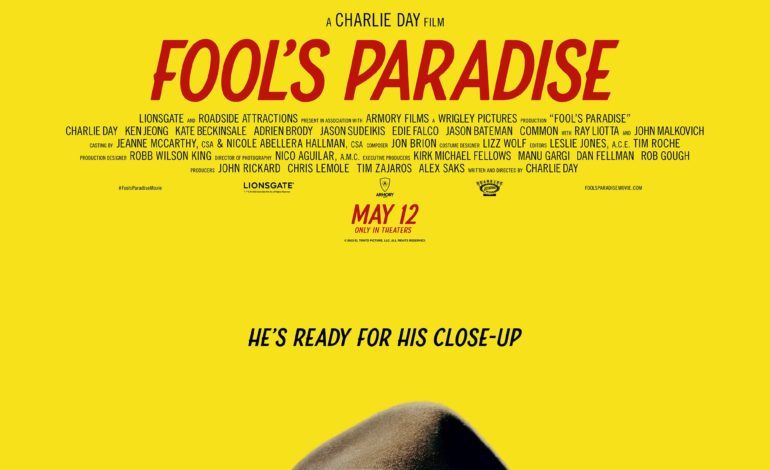

Charlie Day’s directorial debut Fool’s Paradise is a comedy about a mental facility patient who accidentally becomes a major film star due to a series of random and lucky events. The story’s narrative thread also follows Lenny, a non-successful publicist trying to make his way in Hollywood, Lenny’s path crosses with the protagonist’s, Latte Pronto.
Fool’s Paradise is an awkward film without clarity about its genre and tone. The premise is simple and could work well for a comedy; however, while the film advances, it lacks depth and becomes monotonous. The film makes you leave unsatisfied and with a large number of questions.
The main character, Latte Pronto, is a man we meet first at a mental hospice. We learn about him because of a doctor’s conversation about his case: he does not speak; however, he can, he has the mind of a young child, and it appears he is presenting a sort of age regression due to some mysterious trauma. However, the doctor does not have more information and will leave him untreated because the healthcare system will not care for him. He is released and put on a bus to Downton Los Angeles.
Charlie Day’s performance of this character is fascinating and an homage to silent films. The acting resembles Charlie Chaplin, and the film’s narrative resembles some of Chaplin’s movies. As an idea and creative resource, this results interesting at the beginning and makes you wonder where it will go. Latte’s way of being contrasts with everyone else around him. This could result in an intelligent decision; however, the problem is not Day’s performance but everyone else’s. The feature is full of great actors that feel misguided and go in the wrong direction. The tone of the performances is exaggerated, making a caricature of Hollywood instead of an accurate portrait. If the versions were different and more naturalistic, the contrast between the world around Latte and himself would work much better. Lenny, the publicist, could feel like a heartwarming character, and the relationship between both would make much more sense.
Besides the acting direction, Fool’s Paradise has a problem at its roots. The script is inconsistent and shallow. The story is preoccupied with entertainment and follows a comedic tone all the time instead of telling a story that matters and makes sense for its protagonist. The mystery about Latte’s past never resolves or is even discussed after the first 15 minutes of the film, never closing that arc that the film itself proposes when presenting him in the hospital. Since the script gives the mystery, it was something that I wondered through the movie, I wanted to know a little more or at least have some clues about the character’s true identity; however, it never happens, and that made me highly disappointed. I’m presented with a caricature from beginning to end, which is exhausting to watch.
The same happens with every other character’s arc. Everyone is shallow, and yes, it is understood that the film is trying to make a point about Hollywood. However, it is tough to understand or care about that point when you cannot care about one character. That is why it is needed to deepen into the protagonist, and the script fails tremendously. I feel that the concept could be presented more sensitively.
Also, visually it is not very attractive to watch. The visual strategy feels standard, just trying to tell the story, but nothing special about it helps the narrative. Being, in a way, a homage to silent films, many aesthetic aspects could be borrowed from them and would have allowed the film to feel unique. The same happens with the sound design. I’m usually very drawn to soundscapes and music, and in this film, I mainly felt annoyed by its score, as it does not match for some reason. This is, of course, a very personal appreciation. The sound made me think about it during the film, maybe because the character does not speak, but the film feels pretty noisy. Not in an aesthetic way, though.
Score: 1/5
Even though it is not a very long film, it feels challenging to watch after the first 35 minutes. The film is redundant and shallow until it ends. I appreciate certain decisions and ideas behind the story, but the result is not great and honestly not worth watching.
